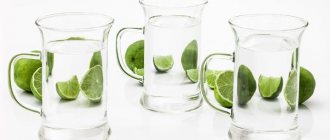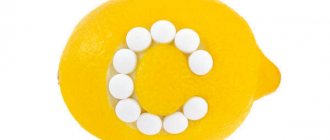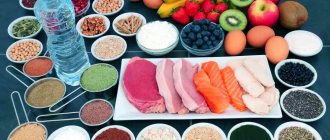Donat Mg is a mineral medicinal water characterized by an increased concentration of magnesium, which is in ionic form. This promotes excellent absorption of this element into the bloodstream and rapid distribution throughout the body.
Mineral water with magnesium is beneficial for humans and is recommended for consumption at all ages. Beneficial features:
- strengthening bones and muscles;
- with increased hyperactivity;
- for the treatment of various diseases associated with the nervous system and with increased stress on it;
- for problems associated with the digestive and circulatory systems.
Instructions for using water
Donat Mg is a medicinal water, so when taking it orally you should follow certain rules and not exceed the required amount. Only a doctor can determine the exact dosage and treatment method, so you should seek advice from a professional.
The characteristics of the body are individual for each person, so the dosage is also calculated individually based on needs. Magnesium is indeed a very important element for the normal functioning of the body; it supports the functioning of most processes that constantly occur in various life support systems. In order to maintain the balance of elements at the desired level and not be subject to various diseases, it is important to restore magnesium levels in case of its deficiency. It is simply necessary to normalize magnesium levels in order not to encounter diseases, as well as to prevent their development. For the best absorption of the element, it is best to dissolve magnesium in water - this is the form that is most acceptable for the human body and allows you to achieve an effective result as quickly as possible.
The consumption rates of milligrams of magnesium per day for various categories of people are as follows:
Donat Mg - mineral “balm” for the body
The main ingredients of the natural solution have a variety of therapeutic effects on the body.
Magnesium
The Mg2+ cation reduces the permeability of cell membranes, thereby reducing the intensity of inflammation. The need for magnesium increases during a busy pace of life, in stressful situations, during pregnancy, and during periods of intensive growth. Deficiency of this component often occurs in old age.
The role of the mineral magnesium in the body:
- maintains electrolyte balance;
- together with phosphorus and calcium, it forms bone tissue;
- participates in energy metabolism, the release of energy in metabolic reactions;
- plays an important role in carbohydrate metabolism, protein synthesis and cell division;
- promotes muscle contractions, including the heart muscle;
- supports the functions of nervous tissue.
Magnesium deficiency is more severely felt by those who are on diets, whose small intestine and its parts are damaged, so absorption is impaired. If cells lack Mg2+, the body removes these cations from the bones and liver. However, losses cannot be compensated for indefinitely by reserves, and as a result, signs of malaise intensify.
Symptoms of magnesium deficiency:
- feeling of numbness or tingling in the limbs;
- fast fatiguability;
- mood swings;
- muscle spasms;
- irritability;
- headache;
- insomnia;
- convulsions;
- constipation.
Sodium and calcium
Sodium is important for maintaining electrolyte balance, glucose absorption, and intestinal enzyme production. Calcium reduces the permeability of cell membranes and has anti-inflammatory and desensitizing effects. It has a positive effect on the growth and strengthening of bone tissue and the condition of teeth. Reduces intestinal motility, reduces increased excitability of the nervous system.
For children:
- 40% in the morning and before lunch;
- 20% before evening meal.
After two and a half hours after eating, you need to drink clean water. Calculating the amount is simple - 30 ml per kilogram of weight.
Before starting the course, you need to familiarize yourself with important rules that guarantee the achievement of effective results.
- At the beginning of the course, it is necessary to consume half of the specified norm to allow the body to get used to the effects of the liquid. Gradually you need to move to the specified amount of drink;
- Water can only be drunk for medicinal purposes; it cannot be used as a substitute for regular liquid;
- The drink must be stored at room temperature, avoiding cold places;
- Donat Mg medicinal water does not compensate for the body's daily need for fluid, so drink the required amount of water in addition to the medicinal drink;
- Before use, be sure to read the contraindications and coordinate the course with your doctor.
INFORMATION AND METHODOLOGICAL MANUAL
Clinical researches:
Study of the effect of medicinal mineral water “Donat Mg” on the state of carbohydrate and lipid metabolism, lipid peroxidation, insulin resistance, functional activity b
-cells and secretion of hormones from adipose tissue in patients with non-insulin-dependent diabetes mellitus
Moscow – 2003
REPORT
on the implementation of research work
„The use of Donat Mg mineral water for
treatment of metabolic disorders in patients with non-insulin-dependent diabetes mellitus"
Relevance of the problem.
According to the WHO Expert Commission, more than 60 million people worldwide currently suffer from diabetes mellitus (DM). Every year this figure increases by 6-10%, which leads to a doubling of this figure every 10-15 years. In economically developed countries, diabetes has become not only a medical, but also a social problem. Metabolic disorders in diabetes are accompanied by such disorders as tissue hypoxia, dyslipoproteinemia, hormonal imbalance, metabolic acidosis, angiopathy, electrolyte disturbances, etc.
Of particular importance is the relationship between disorders of the oxygen transport function of the blood, the blood coagulation system and, as a consequence, the development of microangiopathies. Damage to insulin receptors in various organs and tissues plays an important role in the development of vascular pathology. A decrease in the number of receptors and a decrease in their activity leads to a decrease in their ability to bind insulin, a deficiency of which appears in the tissues.
Drug therapy for metabolic disorders in non-insulin-dependent diabetes mellitus is not always effective, drugs can have side effects, and their cost is quite high. One of the alternative methods for correcting metabolic processes is natural factors and, in particular, drinking mineral waters, which, under certain regimens of their intake, can effectively reduce insulin resistance, promote increased insulin secretion in the digestive period, and optimize metabolic reactions. However, not all mineral waters have been studied in this regard, although some of them, due to their physical and chemical composition, are very interesting for specialists in the field of physiology and pathology of hormonal regulation of metabolism. This fully applies to Donat Mg mineral water, which is supplied to Russia from the Slovenian city of Rogaska Slatina, and its choice for clinical trials in patients with diabetes was due to the following reasons.
Firstly, this is the unique physico-chemical composition of mineral water (see table). The content of Mg ions exceeds 1000 mg/l, which, together with a high concentration of free carbon dioxide of natural origin, bicarbonate and other cations and anions (sodium, potassium, calcium, chloride, sulfate), creates an amazing chemical “cocktail” of biologically active macro- and microelements.
Physico-chemical composition of Donat Mg mineral water
Cations
mg/l Anions mg/l Sodium (Na + ) 1565 Hydrocarbonate (HCOZ - ) 7790 Magnesium (Mg + + ) 1060 Sulfate (SO4 - - ) 2200 Calcium (Ca + + ) 375 Chloride (Cl - ) 66.6 Potassium (K + ) 17.1 Bromide (Br - ) 0.42 Lithium (Li + ) 2.40 Fluoride (F - ) 0.20 Ammonium (NH4 + ) 0.77 Iodide (I - ) 0.12 Iron (Fe. + + ) 0.30 Hydrogen phosphate (HPO4 - - ) 0.12 Aluminum (A1 + + + ) 0.17 Nitrate (NO3 - ) < 0.12 Manganese (Mn + + ) 0.11 Nitrite (NO2 - ) < 0.02 Carbonic anhydride (CO2) 3620 Silicic acid (H2SiO3) 145 Boric acid (NZVOZ) 18 Total mineralization 13250Chemical formula (according to Kurlov):
It is necessary to pay attention to the fact that Donat Mg water is more saturated with bicarbonate ions than world-famous mineral waters (Essentuki No. 4 and No. 17, Borjomi) and significantly exceeds them in the concentration of magnesium ions.
Secondly, this is a fairly high total mineralization - more than 13 g/l, which practically does not affect the excellent taste of Donat Mg mineral water. Everyone knows well that medium-mineralized waters, such as Essentuki No. 17 with a total mineralization of 11.5-12 g/l, have a fairly pronounced specific taste, which is not pleasant for everyone. In this regard, the taste sensations of Donat Mg water are comparable to drinking highly carbonated low-mineralized or even just table mineral waters, although one could theoretically expect a bitter taste characteristic of magnesium salts.
Thirdly, the flow rate of the Donat Mg mineral spring is quite high. In Europe alone, more than 20 million liters are sold per year, and this does not exhaust the capabilities of the well in the Slovenian city of Rogaska Slatina.
Finally, fourthly, this mineral water has stood the test of time. It has been known for more than 400 years, and back in 1680, Professor Paul Sorbeit of the Vienna Faculty of Medicine wrote a monograph on its healing properties. Good clinical results and specific effects due to the presence of magnesium contributed to the fact that Donat Mg mineral water aroused deep interest in the scientific community at several international congresses dedicated to magnesium problems held in Europe in the 80s and 90s years of the last century.
According to the balneological conclusion for the Donat Mg mineral water, compiled by the head of the Test Center of the Russian Scientific Center for Regenerative Medicine and Balneology of the Ministry of Health of the Russian Federation, prof. V.B. Adilov, it is medium-mineralized sulfate-hydrocarbonate sodium-magnesium water with a slightly acidic reaction (pH 6.6). In accordance with the Classification of Mineral Waters of the Ministry of Health of Russia, GOST 13273-88 “Mineral drinking and medicinal table waters”, Donat Mg water belongs to the mineral drinking medicinal water, has no direct analogues used in Russia and is indicated for drinking treatment of various somatic diseases (diseases of digestion, endocrine, cardiovascular systems, nutritional disorders and metabolic disorders).
At the Department of Endocrinology and Diabetology of the Federal Faculty of Postgraduate Education MMA named after. I.M. Sechenov conducted a study to study the effect of mineral water on carbohydrate and lipid metabolism, the state of peroxidation and the activity of antioxidant enzymes, insulin resistance, functional activity of β-cells and the secretion of some adipose tissue hormones involved in the pathogenesis of insulin resistance. The head of the program is the director of the Institute of Diabetes of the Russian Scientific Center of the Russian Academy of Medical Sciences, Doctor of Medical Sciences, Professor M.I. Balabolkin. Performers: research fellows of the department M. Telnova, O. Kozlova, S. Lopatina, S. Reznik.
Purpose of the study.
To assess the effectiveness and safety of using Donat Mg mineral water in patients with type 2 diabetes mellitus receiving various glucose-lowering therapy.
Methodological approaches.
The content of fasting glycemia was used to assess the compensation of carbohydrate metabolism and its monitoring during the period when patients received Donat Mg mineral water. The state of lipid metabolism was assessed by the content of total cholesterol, triglycerides, low-density lipoprotein cholesterol and high-density lipoprotein cholesterol (LDL-C and HDL-C, respectively). During the period of observation of patients, the state of lipid peroxidation was studied (based on the level of malondialdehyde), as well as the state of the antioxidant defense system - based on the activity of the enzymes catalase, superoxide dismutase, and glutathione peroxidase. At the same time, the functional activity of pancreatic b-cells was studied based on the content of immunoreactive insulin (IRI) in the blood serum. Biochemical blood tests included the determination of K, Na, Ca, chlorides, creatinine, and uric acid. The effect of Donat Mg mineral water on the hemostasis system was also assessed by fibrinogen content, coagulogram, and prothrombin time. ECG monitoring was also carried out, and the state of microcirculation was examined. Determination of the adipose tissue hormones leptin and a -tumor necrosis factor was carried out to assess the role and significance of the functional activity of adipose tissue in the state of insulin resistance, which is so characteristic of patients with type 2 diabetes mellitus.
The study was conducted as an open-label controlled trial. The minimum duration of observation was 60 days, the maximum up to 3 months. At the start of treatment with Donat Mg mineral water, all patients were examined, glucose-lowering oral therapy was optimized for at least 4 weeks, after which two groups of 20 people each were randomized, one of which was a control group and the therapy was carried out in this group remained unchanged throughout the observed period, while patients in the second group were prescribed Donat Mg mineral water as part of complex therapy.
Clinical characteristics of the examined patients.
The study included 20 patients (13 women and 7 men) aged from 50 to 75 years (average 63.8 years), suffering from type 2 diabetes mellitus with a disease duration of 2 to 9 years. After examination, observation for at least 4 weeks and selection of appropriate therapy necessary to maintain compensation for diabetes mellitus, 14 patients subsequently underwent diet therapy, and in 6 patients, maintenance of compensation for diabetes mellitus was observed only when taking various glucose-lowering drugs, of which 1 the patient was on insulin therapy and 5 patients were on therapy with oral hypoglycemic drugs.
The control group included 22 patients with type 2 diabetes mellitus (18 women and 4 men), whose average age was 60.3 years. The average duration of diabetes mellitus was 6.4 years. Along with diet therapy, patients were treated with oral glucose-lowering drugs (glibenclamide and Reclid). The duration of treatment was at least 12 weeks (3 months). The dose of drugs was selected individually depending on the patient’s weight and the level of fasting and postprandial glycemia during the initial examination. Dynamic monitoring of glycemic levels was carried out every 14 days and, if necessary, dose adjustment was carried out. All observed patients had vascular complications to varying degrees.
The results of the study.
The results of the studies indicate that, under the influence of a course of taking Donat Mg mineral water, patients with non-insulin-dependent diabetes mellitus experienced significant positive changes in the state of various functional systems that are directly related to the optimization of metabolic processes and other pathogenetic reactions of diabetes mellitus.
This was manifested in the system of regulation of carbohydrate and lipid metabolism (Table 1). If in the control group of patients who received hypoglycemic drugs along with the diet, few significant changes were noted, and they mainly related to the body’s antioxidant defense system, then in patients who additionally received Donat Mg mineral water, favorable dynamics were observed at various levels of the metabolic cycle.
Table 1.
Dynamics of metabolic reactions in patients with diabetes mellitus type 2
| Indicators | ||











